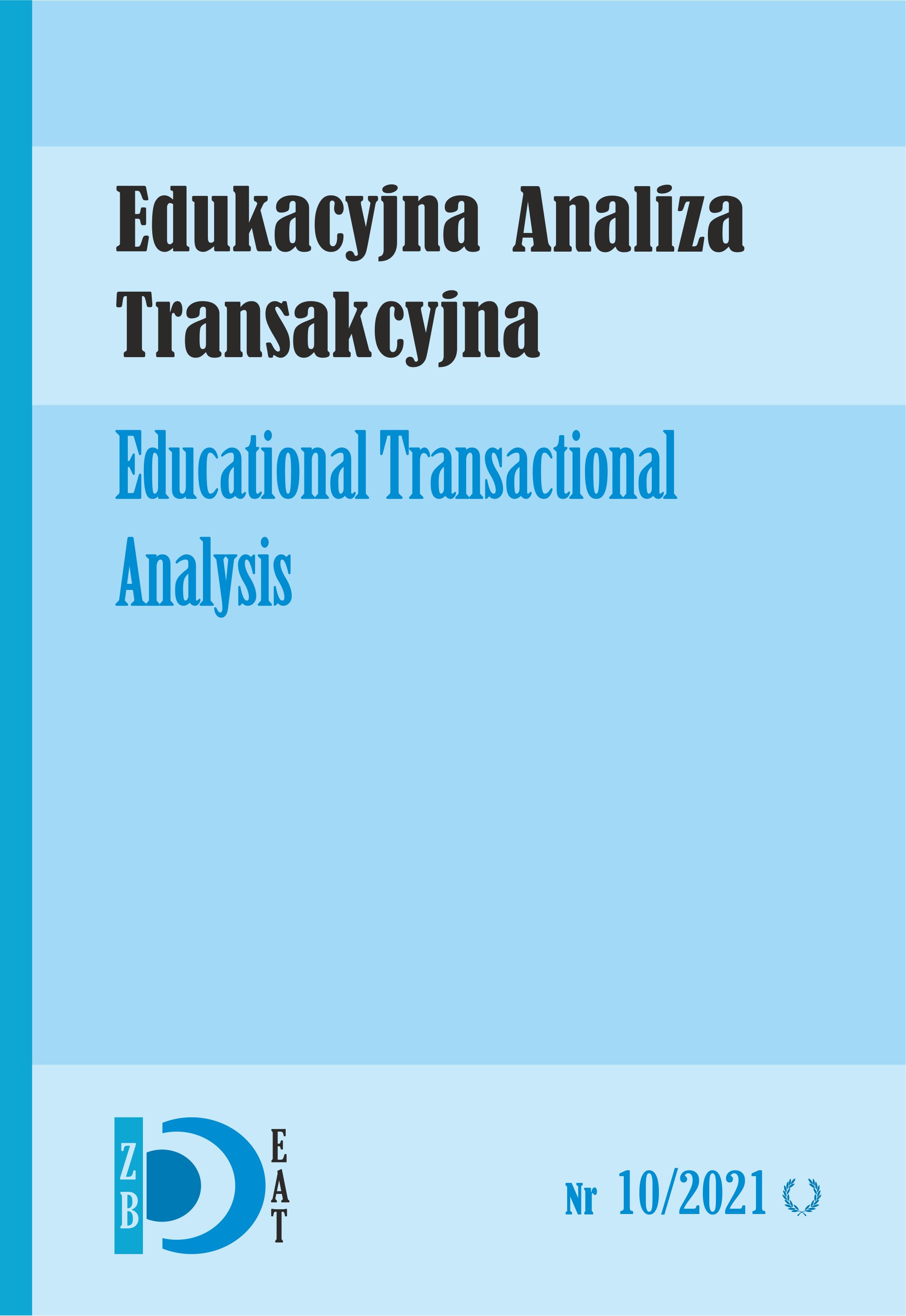Effective school in a crisis COVID-19
Engaging the school community in coping with school challenges based on the Lewin and Fisher model, in transactional analysis terms
DOI:
https://doi.org/10.16926/eat.2021.10.02Keywords:
implementing change, Lewin model, passivity, systemic solutions, rapid response system, Educational Transactional AnalysisAbstract
This article is a case study of coping with the challenge of change at Primary School No. 6 in Września from October to December 2021.
Underlying the intervention work described in the case study was the model of implementing change in an organization proposed by Kurt Lewin (Lewin, 1951; Bhayangkara, 2020) and John Fisher’s approach to individual coping with change (Fisher, 2012). In this paper, we look at the process from the perspective of educational transactional analysis.
The purpose of the process was to increase the sense of psychological and content security of the 7th and 8th grade community during the period of December 2021.
630 individuals actively participated in the process. The analysis was based on qualitative re- search in 5 groups of school community members: teachers (N = 45), students (N = 300), parents (N = 280), a group of psychologists and educators (N = 3) and school management (N = 2). The process included: observation, in-depth interviews, group work, and discussion. Participants also had an opportunity to individually analyze conclusions and proposals developed during the process.
As a result of the actions taken, comprehensive solutions and recommendations were pro- posed, which were communicated and implemented in the community of classes VII and VIII, among students, teachers and parents. In this paper we show that and why parallel work with all major stakeholder groups is necessary to effect change in the school.
Downloads
References
Berne, E. (1966). Principles of Group Treatment. New York: Oxford University Press. Pp. 379
Bhayangkara, A.N. (2020). The Role of Instructional Leadership Through Kurt Lewin Model in Improving the Teacher Capability. Proceedings of the 2nd Early Childhood and Primary Childhood Education (ECPE 2020)
Buchner, A., Majchrzak, M.,Wierzbicka M. (2020). Edukacja zdalna w czasie pandemii. Raport z badań. Centrum cyfrowe. https://centrumcyfrowe.pl/edukacja-zdalna-w-czasie-pandemii-1-edycja/
Buchner, A.,Wierzbicka M. (2020). Edukacja zdalna w czasie pandemii. Raport Spółdzielni Otwartej Edukacji. Centrum cyfrowe. https://centrumcyfrowe.pl/wp-content/uploads/sites/16/2020/11/Raport_Edukacja-zdalna-w-czasie-pandemii.-Edycja-II.pdf
Długosz, P., Liszka, D., Walawender, P., Gagat-Matuła, A. (2021). Project: Identification of barriers hindering the Ukrainian and Polish students' return to schools. Wyniki wstępne. https://www.researchgate.net/publication/354494486_Wyniki_wstepne
Emmerton, N., Newton, T. (2004). The Journey of Educational Transactional Analysis from Its Beginnings to the Present. Transactional Analysis Journal, 34(3), 283–291. doi:10.1177/036215370403400314
Fisher, J. (2005) A Time for Change?, Human Resource Development International, 8:2, 257-263, DOI: 10.1080/13678860500100665
Grzelak, S., Żyro, D. (2021). Jak wspierać uczniów po roku epidemii? Wyzwania i rekomendacje dla wychowania, profilaktyki i zdrowia psychicznego. Raport oparty na wynikach badań, przeprowadzonych wśród uczniów, rodziców i nauczycieli w okresie 04.2020 – 01.2021
Jacy ludzie taka szkoła. Osobiste doświadczenia z pandemii. (2021). Łuczyńska, A., Pyżalski, J. https://www.szkolazklasa.org.pl/materialy/publikacja-jacy-ludzie-taka-szkola-osobiste-doswiadczenia-z-pandemii/
Pierzchała, A. (2019). The Use of Passivity Strategies in a Group of 10–12 Year-old Pupils from the Perspective of Transactional Analysis. Pedagogika / Pedagogy 2019, t. 134, Nr. 2, p. 185–207
Plebańska, M., Szyller, A., Sieńczewska, M., Edukacja zdalna w czasach covid-19. Raport z badania. https://kometa.edu.pl/uploads/publication/941/24a2_A_a_nauczanie_zdalne_oczami_nauczycieli_i_uczniow_RAPORT.pdf?v2.8
Ptaszek, G., Stunża, G. D., Pyżalski, J., Dębski, M., Bigaj, M. (2020). Edukacja zdalna: co stało się z uczniami, ich rodzicami i nauczycielami? Gdańsk: Gdańskie Wydawnictwo Psychologiczne. https://zdalnenauczanie.org/wp-content/uploads/2020/10/ZDALNA-EDUKACJA_FINAL.pdf
Pyżalski, J. (2021). Zdrowie psychiczne i dobrostan młodych ludzi w czasie pandemii COVID-19 – przegląd najistotniejszych problemów. Dziecko Krzywdzone. Teoria, badania, praktyka, 20(2), 92–115.
Sobiesiak-Penszko, P., Pazderski. F. (2020). Dyrektorzy do zadań specjalnych – edukacja zdalna w czasach izolacji. Prezentacja wyników badania. https://www.isp.org.pl/uploads/drive/aktualnosci/RAPORT_Dyrektorzy_do_zadan_specjalnych_08.06.pdf
Stewart, I., Joines, V. (2016). Analiza Transakcyjna Dzisiaj. Rebis. Poznań
The State of the World's Children 2021. On My Mind: Promoting, protecting and caring for children’s mental health. (2021). https://www.unicef.org/reports/state-worlds-children-2021
Vos, J., van Rijn, B., (2021). The Evidence-Based Conceptual Model of Transactional Analysis: A Focused Review of the Research Literature, Transactional Analysis Journal, 51:2, 160-201, DOI: 10.1080/03621537.2021.1904364
Wright, KP. (2020). Sleep in university students prior to and during COVID-19 Stay-at
-Home orders. Current Biology. VOLUME 30, ISSUE 14. DOI:https://doi.org/10.1016/j.cub.2020.06.022
Downloads
Published
Versions
- 2021-12-30 (3)
- 2022-05-20 (2)
- 2021-12-30 (1)
How to Cite
Issue
Section
License
Copyright (c) 2022 Justyna Józefowicz

This work is licensed under a Creative Commons Attribution 4.0 International License.
I am aware that the Educational Transactional Analysis journal is published under a Creative Commons license - Attribution (https://creativecommons.org/licenses/by/4.0/legalcode).
By submitting the article, I agree to make it available under this license

